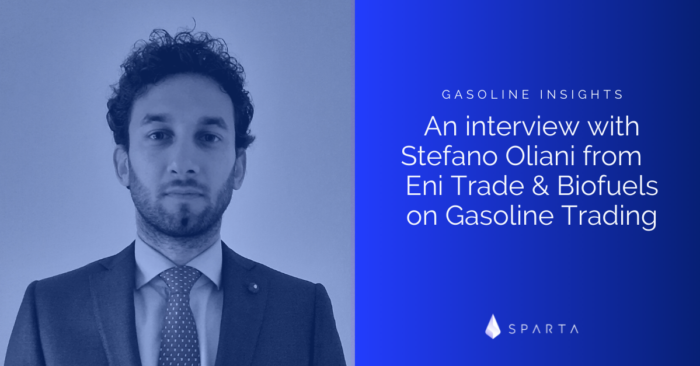An Interview With Stefano Oliani From Eni Trade & Biofuels On Gasoline Trading

“Technology needs to be used efficiently. We are bombarded with information and that can be also confusing. Hence, the ability to quickly filter the information and act consequently is going to be decisive for a successful result.”
— Stefano Oliani, Eni Trade & Biofuels
Stefano Oliani joined Eni group’s trading division in London in 2017 as gasoline trader. He has been active in both physical and paper trading with also a blending activity in the Med area. He is currently in Germany where he is in charge of Eni’s wholesale department for the inland market.
We recently chatted with Stefano to get his perspectives on the gasoline market. Here is what he had to say.
WHAT ARE THE CURRENT CHALLENGES THAT GASOLINE TRADERS FACE?
One of the current challenges that gasoline traders face is the continuous change in the regulations towards the carbon neutrality. CO2 reduction is definitely a challenge. Gasoline will still be traded in the coming years but the balance of supply and demand can easily shift in a different direction and modify the usual gasoline routes. The increase of electric vehicles, especially in Europe, even if not in the short term, needs also to be taken into account.
Other common challenges include the uncertainty of the geopolitical scenario and when and how the COVID-19 pandemic will be over. The pandemic especially has been a game changer in 2020. IMO 2020 regulations and TIER 3 in the US were both a bullish signal at the end of 2019. However, the pandemic has changed it all and brought to a weak market for a long period, giving advantage to whom could store the product and lock the massive contango seen last year.
HOW HAS THE JOB EVOLVED OVER THE LAST FEW YEARS?
It has become tougher and tougher. Every cent counts and there is no “easy” deal. The transparency of the market and the possibility to be informed on almost everything does not provide much advantage to anyone. Every deal is becoming sharp on a P&L perspective.
HOW IS TECHNOLOGY HELPING GASOLINE TRADERS TO BECOME MORE EFFICIENT?
Technology is helping massively especially in disclosing skills and knowledge to a broad audience. There are many tools and software available that can really help a trader, even a junior one, in making a decision on a trade in a couple of seconds. However, I think it can also be risky to depend only on technology for a trading activity. At the end, technology has to be a strong support to be added to professional experience and also to one’s personal feeling.
WHAT WILL GASOLINE TRADERS NEED IN THE FUTURE TO SUCCEED?
Patience. The gasoline market is becoming difficult, competition is really high and the decision to go all in and risk everything is tempting. Gasoline is a very volatile commodity, which is good for traders with a risk appetite. But volatility can be a double-edged sword. Those who are not able to manage it, will bleed. In the long run, I would always suggest to look at the fundamentals.
HOW DO YOU FORESEE GASOLINE TRADING CHANGING IN THE NEXT 5-10 YEARS?
We have already reached a high level of technology in our industry. I am not sure how much can be done on top of this. But again, in this fast paced environment, being the first will be everything. Technology needs to be used efficiently. We are bombarded with information and that can be also confusing. Hence, the ability to quickly filter the information and act consequently is going to be decisive for a successful result.